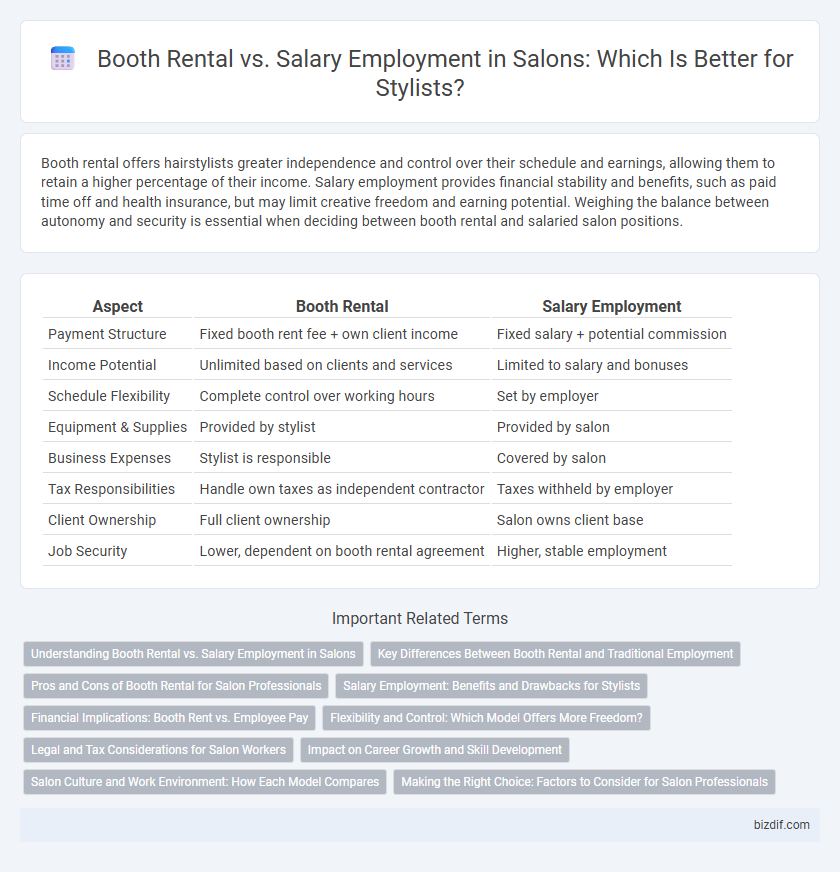Booth rental offers hairstylists greater independence and control over their schedule and earnings, allowing them to retain a higher percentage of their income. Salary employment provides financial stability and benefits, such as paid time off and health insurance, but may limit creative freedom and earning potential. Weighing the balance between autonomy and security is essential when deciding between booth rental and salaried salon positions.
Table of Comparison
| Aspect | Booth Rental | Salary Employment |
|---|---|---|
| Payment Structure | Fixed booth rent fee + own client income | Fixed salary + potential commission |
| Income Potential | Unlimited based on clients and services | Limited to salary and bonuses |
| Schedule Flexibility | Complete control over working hours | Set by employer |
| Equipment & Supplies | Provided by stylist | Provided by salon |
| Business Expenses | Stylist is responsible | Covered by salon |
| Tax Responsibilities | Handle own taxes as independent contractor | Taxes withheld by employer |
| Client Ownership | Full client ownership | Salon owns client base |
| Job Security | Lower, dependent on booth rental agreement | Higher, stable employment |
Understanding Booth Rental vs. Salary Employment in Salons
Booth rental in salons offers stylists the flexibility to operate as independent contractors, managing their own schedules, clients, and business expenses while retaining full control over their earnings. Salary employment provides a steady income with benefits and less financial risk, but stylist autonomy and income potential may be limited by the salon's pricing and policies. Understanding these models helps salon professionals choose between entrepreneurial freedom and job stability based on their career goals and financial needs.
Key Differences Between Booth Rental and Traditional Employment
Booth rental in salons offers stylists independent control over their schedule, pricing, and client management, allowing for higher earning potential but requiring self-promotion and expense management. Traditional salaried employment provides consistent income, benefits, and less financial risk, with salon owners handling marketing and supplies. The key differences revolve around autonomy, financial responsibility, and the level of support provided by the salon.
Pros and Cons of Booth Rental for Salon Professionals
Booth rental offers salon professionals greater autonomy, flexible scheduling, and the ability to retain a larger percentage of their earnings, making it ideal for experienced stylists seeking independence. However, it requires managing overhead costs such as rent, supplies, and marketing, which can reduce net income and increase financial risk. Unlike salaried employment, booth renters lack benefits like health insurance and paid time off, demanding strong business skills and self-motivation to succeed.
Salary Employment: Benefits and Drawbacks for Stylists
Salary employment in salons offers stylists consistent income, health benefits, and paid time off, providing financial stability often lacking in booth rental arrangements. However, stylists may face limited flexibility in scheduling and less autonomy over pricing and client selection compared to booth renters. Employers typically manage marketing and product costs, allowing salaried stylists to focus solely on service delivery and skill development.
Financial Implications: Booth Rent vs. Employee Pay
Choosing booth rental allows salon professionals to retain a larger portion of their earnings by paying a fixed rental fee, often leading to higher overall income potential compared to salary employment. Salary employment provides stable, predictable income with benefits, but typically involves commissions or percentage splits that reduce take-home pay. Analyzing monthly booth rental costs against expected salary and commission rates is crucial for maximizing financial gains in a salon setting.
Flexibility and Control: Which Model Offers More Freedom?
Booth rental offers salon professionals greater flexibility and control over their schedules and services, allowing them to set their own hours and pricing strategies. Salary employment provides less autonomy, as stylists must adhere to salon policies, hours, and service menus determined by management. Choosing between these models depends on whether a stylist prioritizes independence or the stability of a fixed income.
Legal and Tax Considerations for Salon Workers
Salon workers must carefully evaluate legal and tax implications when choosing between booth rental and salary employment. Booth renters are typically classified as independent contractors, responsible for managing their own taxes, insurance, and business expenses, which requires strict compliance with IRS guidelines to avoid misclassification penalties. Salaried employees benefit from employer-paid payroll taxes, workers' compensation, and unemployment insurance but may face less flexible work schedules and income variability.
Impact on Career Growth and Skill Development
Booth rental offers stylists the autonomy to manage their own schedules and client base, fostering entrepreneurial skills and personalized brand development, which can accelerate career growth. Salary employment provides structured training, consistent income, and opportunities for mentorship, enhancing technical skills and professional development within an established salon environment. Choosing between booth rental and salaried positions significantly influences a stylist's ability to expand expertise and progress in the competitive beauty industry.
Salon Culture and Work Environment: How Each Model Compares
Booth rental offers stylists independence and control over their schedule, attracting those who value entrepreneurial freedom and personalized client relationships within the salon culture. Salary employment provides a structured work environment with consistent income, fostering collaboration and team dynamics that enhance salon culture through shared goals and support. Both models shape the work environment distinctly, influencing stylist motivation, client experience, and overall salon atmosphere.
Making the Right Choice: Factors to Consider for Salon Professionals
Salon professionals deciding between booth rental and salary employment should evaluate factors such as income stability, control over scheduling, and client base ownership. Booth rental offers greater autonomy and potential for higher earnings but requires self-management of expenses and marketing. Salary employment provides consistent pay and benefits, with less financial risk but limited flexibility and commission-based growth.
Booth rental vs Salary employment Infographic

 bizdif.com
bizdif.com